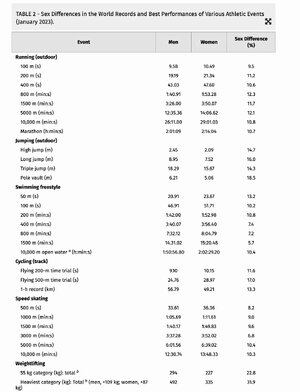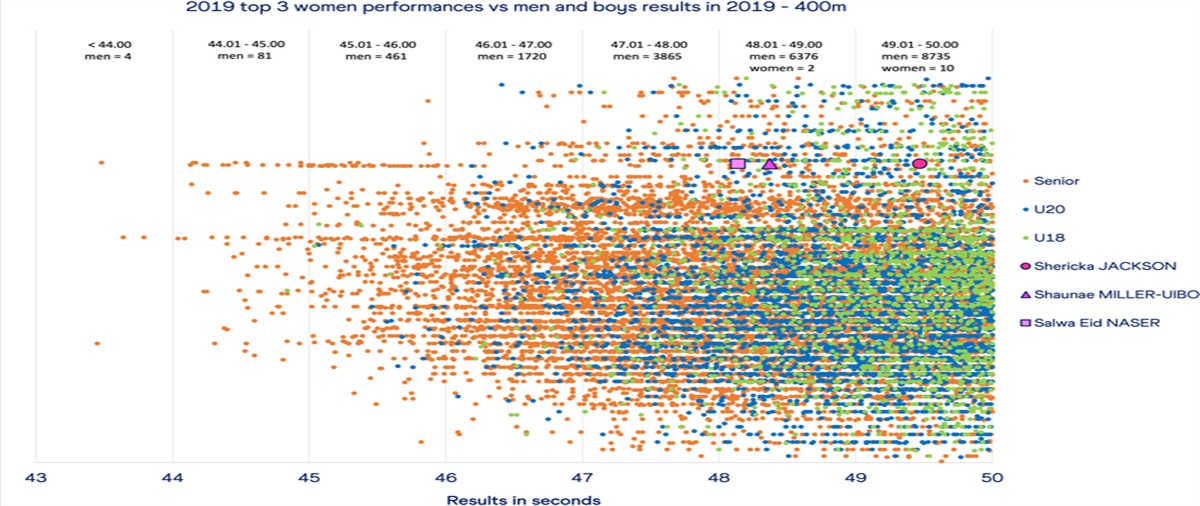Here is an article that explains the official position of the American College of Sports Medicine on the differences between men and women in athletic performance.
tic events and sports relying on endurance, muscle strength, speed, and power, males typically outperform females by 10%–30% depending on the requirements of the event. These sex differences in performance emerge with the onset of puberty and coincide with the increase in endogenous sex steroid...

journals.lww.com
Abstract
Biological sex is a primary determinant of athletic performance because of fundamental sex differences in anatomy and physiology dictated by sex chromosomes and sex hormones. Adult men are typically stronger, more powerful, and faster than women of similar age and training status. Thus, for athletic events and sports relying on endurance, muscle strength, speed, and power, males typically outperform females by 10%–30% depending on the requirements of the event.
These sex differences in performance emerge with the onset of puberty and coincide with the increase in endogenous sex steroid hormones, in particular testosterone in males, which increases 30-fold by adulthood, but remains low in females. The primary goal of this consensus statement is to provide the latest scientific knowledge and mechanisms for the sex differences in athletic performance. This review highlights the differences in anatomy and physiology between males and females that are primary determinants of the sex differences in athletic performance and in response to exercise training, and the role of sex steroid hormones (particularly testosterone and estradiol). We also identify historical and nonphysiological factors that influence the sex differences in performance. Finally, we identify gaps in the knowledge of sex differences in athletic performance and the underlying mechanisms, providing substantial opportunities for high-impact studies. A major step toward closing the knowledge gap is to include more and equitable numbers of women to that of men in mechanistic studies that determine any of the sex differences in response to an acute bout of exercise, exercise training, and athletic performance...
INTRODUCTION
Biological sex is a primary determinant of performance in many athletic events and physical tasks. In athletic events and sports relying on endurance, muscle strength, speed, and power, men typically outperform women because of fundamental sex differences dictated by their sex chromosomes and sex hormones at puberty, in particular, testosterone. For example, the advantages of men over women in athletic performance that require muscle power and endurance are illustrated in the comparison of the best times of men 400-m runners and the top 3 women running times in 2019 where motivation does not differ between sexes (
Fig. 1). Over 10,000 men (including boys <18 yr) ran faster than the three fastest recorded women in that year (2019), illustrating no overlap in the performance of men and women at the top level. These numbers underscore the historical and current rationale for biological sex–based categories in many athletic events because the top adult males almost always outperform the top females in events that rely on muscle power, strength, speed, and/or endurance. In contrast, in sporting events and physical tasks where performance relies more on skill than muscle power and endurance, such as archery, the sex differences among the world’s best is minimal. This variation in the magnitude of the sex difference in performance across sports and physical tasks is a consequence of the difference in the timing and effects of sex steroid hormones during growth and development and their varying effects on the different biological systems that are most utilized during athletic events (e.g., muscle vs central nervous system). Understanding the latest science for the differences in performance between males and females can inform policies of governing sports and athletic organizations on the inclusion of athletes who are transgender (1,2) and/or have disorders (or differences) of sex development (DSD), also referred to as intersex, within sex-based categories of competition. Thus, we provide definitions of sex and gender (see discussion hereinafter), and a clear picture of the science that dictates those factors that differentiate sexes in athletic performance across different events, as we address the role and inclusion of males and females, men and women in sports, and professions that require physical performance (3,4). Such information will also provide a rationale for sex-specific requirements of tactical athletes in professions with an historically strong male presence (e.g., law enforcement, military, and firefighters) as their professions open to the inclusion of more females (5,6). Lastly, because males and females can respond differently to acute exercise bouts, and historically exercise and sports-based research has concentrated on males, more information is needed particularly on the female response during exercise and adaptations to training and rehabilitation...



